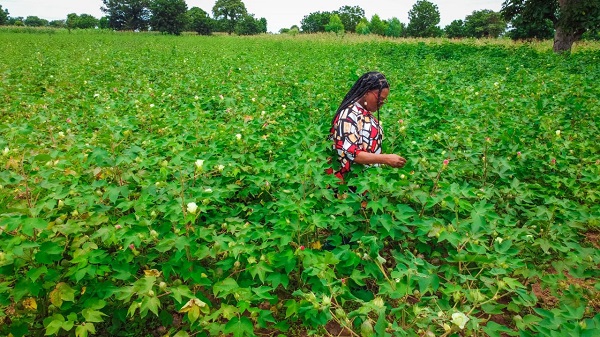
The National Biotechnology Development Agency (NABDA) has expressed its admiration for the flourishing cotton farms managed by former Secretary to the Government of the Federation (SGF), Mr. Babachir Lawal.
The agency lauded this initiative and urged other high-capacity farmers to follow suit, emphasising that such ventures can significantly contribute to enhancing Nigeria’s gross domestic product (GDP).
Lawal is currently overseeing four cotton farms, totalling 235 hectares, all located in communities around his birthplace in the Hong local government area of Adamawa State. These farms were cultivated using biotech-improved cotton seeds known for their disease resistance and high yield potential.
During an inspection tour of the farms, the director of the agricultural biotechnology department at NABDA, Dr. Rose Gidado expressed her delight at the promising state of the cotton plants, which had already produced buds indicative of high cotton yields.
“We are here for a follow-up visit. In March or April of this year, former SGF Babachir Lawal visited our office, expressing his desire for improved cotton seeds, particularly biotech-improved seeds,” explained Gidado.
“He acquired Bt cotton, specifically Bollgard II cotton, engineered to resist pink Bollworm, a destructive pest that damages cotton plants during fruiting,” she added.
Gidado highlighted that conventional or local cotton seed varieties are often plagued by diseases and fail to yield sufficiently. Lawal’s decision to invest in improved seeds and cultivate them in Hong has yielded successful results, with cotton plants boasting an abundance of buds, ranging from 70 to 100 per plant. These cotton plants are perennial and continue to yield buds as long as there is sufficient water from rainfall or irrigation.
Praising Babachir’s efforts, Gidado encouraged other high-capacity farmers to follow suit and invest in improved seed cotton farming, as they can export their harvests, thereby contributing to Nigeria’s GDP.
Babachir’s genetically engineered bollworm-resistant Bt cotton variety has the potential to yield at least 3.5 tons of cotton per hectare, and under favourable agronomic practices, this can even reach 4.1 to 4.4 tons per hectare.
Gidado stressed the need for the federal government to resuscitate the textile industry to create a ready market for cotton production. She suggested that loan repayment interest rates for farmers should be low, and they should also receive input support.
The director believes that this revival could empower individuals and improve the country’s GDP, calling on state governments and wealthy individuals to provide soft loans for farmers to engage in cotton production using improved seed varieties.
She also emphasised the importance of good agronomic practices for effective farm management.
Gidado noted that a return to cotton cultivation would provide ginneries and textile industries with access to abundant raw materials.
The manager of the farms, Malam Abdullahi Shelleng expressed optimism for even higher yields, highlighting the significant difference between the old and modified cotton varieties. The older variety required frequent chemical spraying and still failed to yield meaningful results, often producing only two tons per hectare. In contrast, the improved cotton variety overseen by Lawal can yield between five and six tons per hectare.
Lawal manages four cotton farms, each with its own name and located in different parts of the Hong local government area: Gudi Farm (78 hectares), Uvudu Farm (27 hectares), Wurobaya Farm (35 hectares) and Mbilinyi Farm (95 hectares). These thriving farms represent a beacon of hope for the cotton industry and agricultural transformation in Nigeria.


